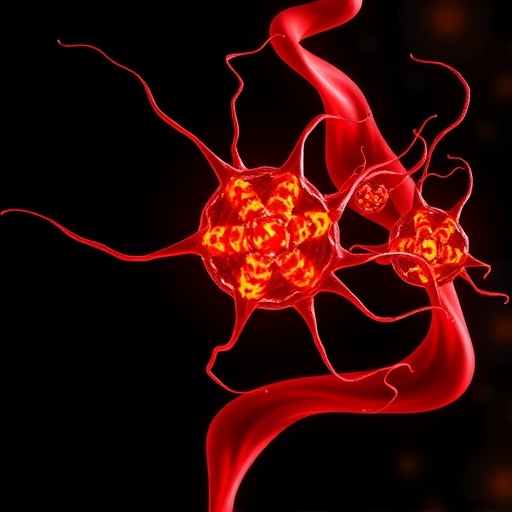In a groundbreaking new study poised to reshape our understanding of laryngeal squamous cell carcinoma (LSCC), researchers have unveiled a critical molecular mechanism that governs tumor progression by modulating a form of programmed cell death known as pyroptosis. This revelation centers around NAT10, an enzyme previously implicated in various cancers, now found to suppress pyroptosis through chemical modification of a key messenger RNA, thereby advancing the malignancy of LSCC.
Laryngeal squamous cell carcinoma, the predominant cancer affecting the larynx and a major form among head and neck cancers, presents a significant clinical challenge due to its aggressive nature and complex biological behavior. A key insight from this study is the role of NAT10, an enzyme recognized for catalyzing the acetylation of RNA molecules at the N4 position of cytidine (ac4C modification), which profoundly influences RNA stability and gene expression patterns within cancer cells.
Employing a comprehensive suite of molecular biology techniques, the investigators meticulously analyzed tissue samples and cellular models of LSCC. Their results demonstrated that NAT10 expression is markedly elevated in both tumor tissues and LSCC-derived cell lines. Importantly, this upregulation showed a strong positive correlation with higher tumor grade and advanced clinical stage, suggesting a vital role in tumor aggressiveness and disease progression.
.adsslot_50ekiPydQ7{ width:728px !important; height:90px !important; }
@media (max-width:1199px) { .adsslot_50ekiPydQ7{ width:468px !important; height:60px !important; } }
@media (max-width:767px) { .adsslot_50ekiPydQ7{ width:320px !important; height:50px !important; } }
ADVERTISEMENT
The exploration did not stop at descriptive correlation. Functional knockdown experiments targeting NAT10 revealed a demonstrable increase in pyroptosis—a form of inflammatory programmed cell death that can act antagonistically towards cancer cells. This inverse relationship highlights NAT10 as a suppressive regulator of pyroptosis, thus facilitating tumor survival and expansion by evading this cell death pathway.
Delving deeper into the molecular interplay, the researchers identified ELANE, the gene encoding neutrophil elastase, as a direct target of NAT10-mediated regulation. Neutrophil elastase plays multifaceted roles in inflammation and cellular homeostasis, and in this context, its expression was found to be suppressed by NAT10 through reducing the stability of its mRNA. The ac4C modification orchestrated by NAT10 effectively destabilizes ELANE transcript, leading to diminished protein levels and dampened pyroptotic activity.
This intricate NAT10-ELANE axis underscores the enzyme’s capacity to exert post-transcriptional control over gene expression, disrupting the delicate balance between cell survival and programmed death. The findings illuminate how epitranscriptomic modifications, particularly RNA acetylation, serve as pivotal regulatory switches in cancer biology, opening novel avenues for therapeutic intervention.
The study harnessed state-of-the-art methodologies such as methylated RNA immunoprecipitation (MeRIP), RNA immunoprecipitation (RIP), and dual-luciferase reporter assays to validate the direct binding and functional consequence of NAT10 on ELANE mRNA. These robust experimental approaches confirmed the acetylation-dependent modulation of ELANE stability, solidifying the molecular foundation of this regulatory mechanism.
Moreover, in vivo experiments further corroborated the inhibitory role of NAT10 in pyroptosis within LSCC models, strengthening the translational relevance of these findings. By modulating RNA modification and consequent gene expression, NAT10 emerges as a master regulator that shields tumor cells from pyroptotic death, furnishing a survival advantage that promotes tumor growth and therapeutic resistance.
Intriguingly, pyroptosis, unlike apoptosis, triggers a potent inflammatory response mediated by cell membrane pore formation and release of pro-inflammatory cytokines. The suppression of pyroptosis by NAT10 may not only aid in tumor cell evasion from death but also influence the tumor microenvironment by modulating local immune responses, thereby fostering a niche conducive to cancer progression.
Drawing from these insights, the NAT10-ac4C-ELANE axis presents as a compelling molecular target for future drug development. Therapeutic agents designed to inhibit NAT10 activity or disrupt its acetylation of ELANE mRNA could effectively restore pyroptotic pathways, enhancing cancer cell clearance and improving patient outcomes in LSCC.
This study’s findings carry significant implications beyond LSCC, as RNA modifications and their regulatory enzymes have emerged as universal modulators in diverse cancer types. Understanding how epitranscriptomic alterations interface with cell death mechanisms may revolutionize cancer therapy, allowing precision targeting of pathways once deemed inaccessible.
Furthermore, the clarity brought to RNA acetylation’s role in tumorigenesis invites a broader exploration of RNA-modifying enzymes as central players in cancer biology. The dynamic and reversible nature of such modifications opens a promising therapeutic window, offering specificity and reduced off-target effects compared to conventional treatments.
As the landscape of cancer research expands to include RNA modifications, this study exemplifies the power of integrating molecular, cellular, and animal models to dissect complex biological phenomena. It underscores the necessity of interdisciplinary strategies combining biochemistry, molecular genetics, and clinical oncology to translate benchside discoveries into bedside interventions.
In conclusion, the elucidation of NAT10’s inhibitory effect on pyroptosis through ac4C modification of ELANE mRNA illuminates a novel epitranscriptomic pathway driving LSCC progression. This discovery not only deepens our biological understanding but also heralds a new frontier for targeted therapies aimed at reactivating intrinsic cell death programs to combat malignancy.
The revelations from this research stand poised to inspire subsequent investigations into the role of RNA modifications in cancer and ignite the pursuit of innovative treatments that harness the cell’s own death machinery. As such, the NAT10-ac4C-ELANE pathway may soon become a focal point for combating LSCC and potentially other refractory cancers that evade immune destruction.
Subject of Research: Molecular mechanisms of pyroptosis regulation in laryngeal squamous cell carcinoma via RNA acetylation.
Article Title: NAT10 inhibits the pyroptosis of laryngeal squamous cell carcinoma through ac4C modification of ELANE mRNA.
Article References:
Yu, Y., Yan, J. NAT10 inhibits the pyroptosis of laryngeal squamous cell carcinoma through ac4C modification of ELANE mRNA. BMC Cancer 25, 970 (2025). https://doi.org/10.1186/s12885-025-14352-0
Image Credits: Scienmag.com
DOI: https://doi.org/10.1186/s12885-025-14352-0
Tags: ac4C modification and cancercancer cell gene expressionclinical implications of LSCChead and neck cancer studieslaryngeal squamous cell carcinoma researchmolecular biology techniques in oncologyNAT10 enzyme laryngeal cancerprogrammed cell death mechanismspyroptosis in cancer cellsRNA modification in tumorstumor grade and NAT10 correlationtumor progression and aggressiveness





